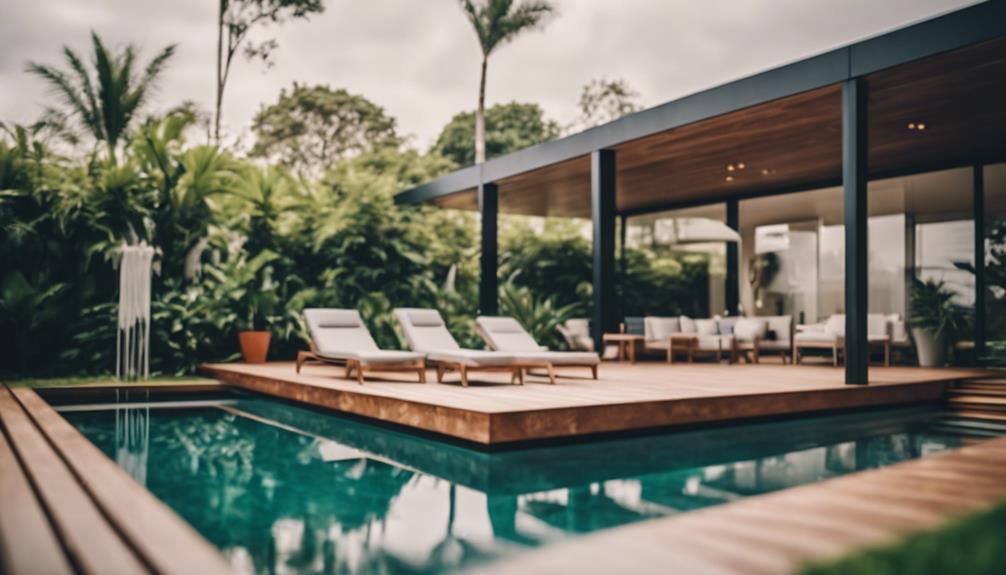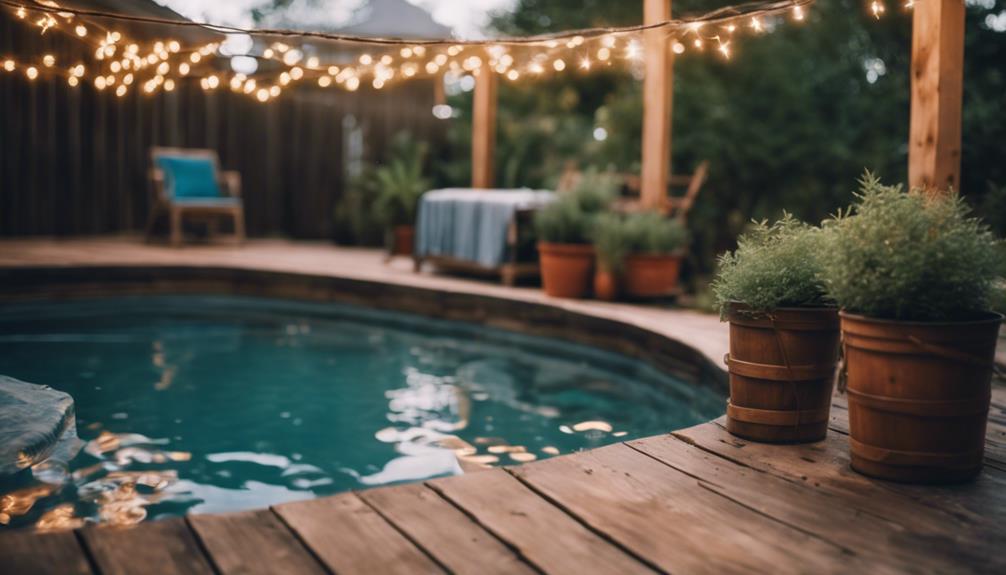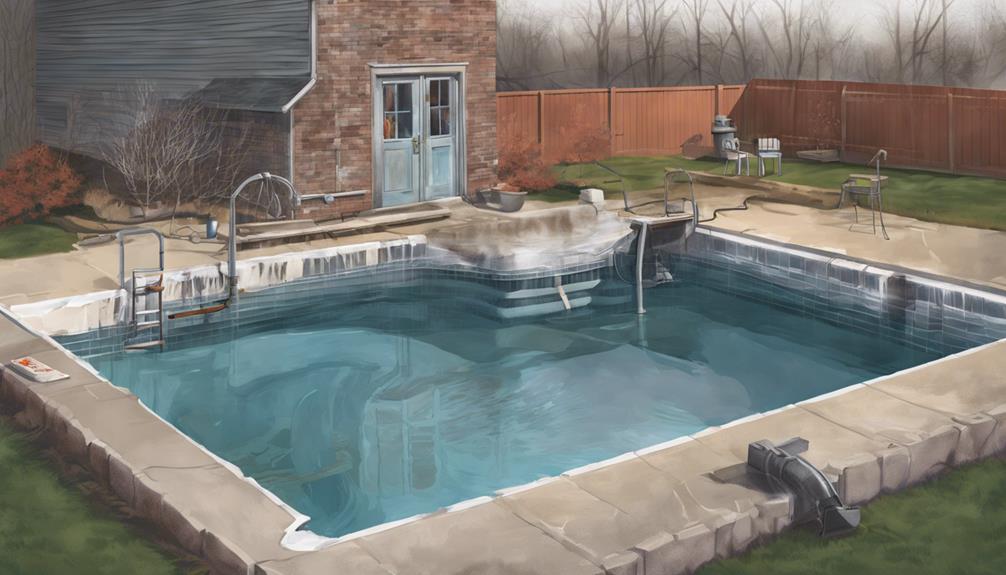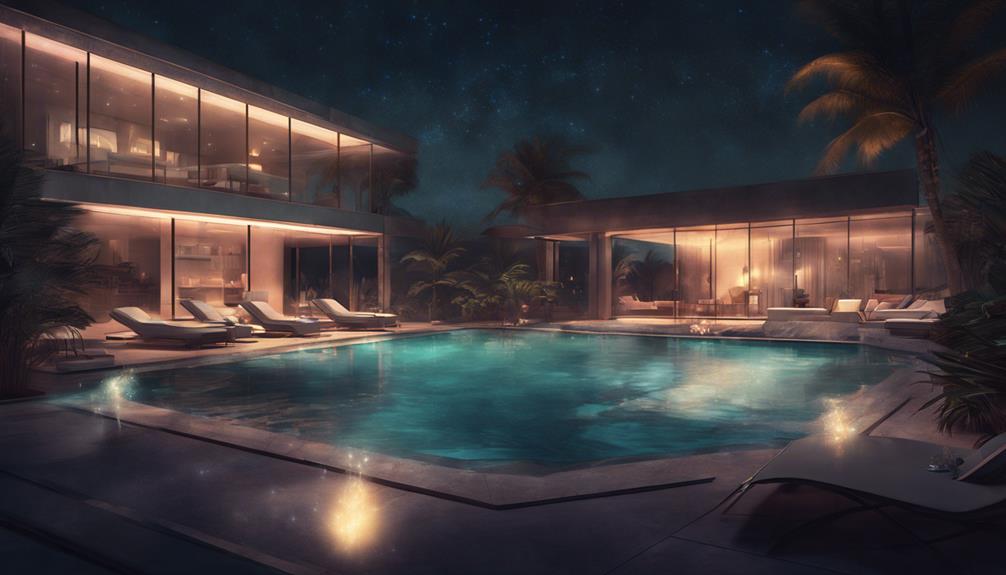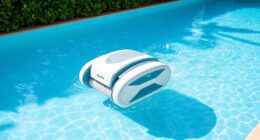To wisely plan for the construction of a swimming pool, begin by establishing a realistic budget based on the value of your home and the local costs. Take the time to research reputable contractors by verifying their licenses, examining past work, and checking their industry affiliations. When it comes to the design of your pool, prioritize essential features and consider long-term maintenance costs to keep expenses down. Make sure to compare quotes from multiple contractors by carefully reviewing itemized costs and transparency in pricing. Negotiate for the best possible price by discussing cost-saving strategies and fully understanding the scope of the project. Once you have chosen a contractor, finalize the agreement with a detailed breakdown of costs and a structured payment plan. By following these steps, you can ensure that you get the best deal for your swimming pool project without compromising on quality. For more in-depth information, please refer to the detailed research provided.
Key Takeaways
- Compare multiple quotes for labor and materials breakdowns.
- Negotiate based on project scope, features, and materials.
- Seek cost-saving strategies and potential discounts.
- Ensure transparent pricing and detailed cost breakdown.
- Confirm structured payment schedule and warranty information.
Setting a Realistic Budget
To set a realistic budget for your swimming pool project, begin by determining a percentage of your home's value to establish financial expectations. This approach guarantees that you allocate funds sensibly and avoid overspending.
When planning for pool installation, saving money is often a top priority for many homeowners. Research average costs in your area for similar pool installations to gauge your budget requirements accurately. By understanding the typical expenses associated with pool projects in your region, you can set a budget that aligns with realistic financial expectations.
Additionally, consider potential ways to save money during the pool installation process. Some cost-saving strategies may include obtaining multiple quotes from reputable contractors, exploring different pool design options, and being open to cost-effective materials.
Researching Reputable Contractors

Before hiring a contractor for your swimming pool project, it's essential to verify their licenses, insurance coverage, and warranties.
Additionally, checking past work quality, reviews, and client references can give you insight into their reliability.
Reviewing a contractor's project portfolio is also vital to guarantee they can deliver the results you desire.
Contractor Credentials Check
Researching reputable contractors for your inground pool project involves confirming licenses, bonding, and insurance coverage to guarantee legal compliance and financial protection. To make certain you're hiring a reliable professional for your pool installation, consider the following:
- Past Work Quality: Review the pool companies' past projects, references, and portfolio to assess their reputation.
- Warranties Offered: Look for contractors who provide warranties on their work to guarantee customer satisfaction and peace of mind.
- Industry Affiliations: Check if the contractors are members of industry associations such as the Pool & Hot Tub Council of Canada for added credibility.
- Skills and Certifications: Verify that the contractors have the necessary skills, training, and certifications to handle the complexities of pool installation.
Client Referrals Verification
When vetting reputable contractors for your inground pool project, a key step is confirming client referrals to validate that the contractor's reputation aligns with their claims and promises. Contacting past clients allows you to gain insights into the contractor's work quality, professionalism, and adherence to timelines.
Ask for multiple referrals to get a well-rounded view of the contractor's performance and customer satisfaction levels. Additionally, researching online reviews and ratings can provide further validation of the contractor's reliability and reputation in the industry. Positive feedback from previous clients is a strong indicator of a contractor's trustworthiness and capability to deliver on their promises.
It's vital to verify that the contractor has a history of completing inground pool projects successfully and satisfying their customers. By conducting thorough client referrals verification, you can make an informed decision and choose a contractor with a proven track record of quality work and happy clients.
Project Portfolio Review
Reviewing a contractor's project portfolio provides valuable insights into their past work quality and design capabilities, helping you in evaluating their suitability for your swimming pool project.
When researching reputable contractors for your swimming pool project, make sure to take into account the following:
- Assess the quality and scope of their previous work to gauge their experience and expertise in designing swimming pools.
- Look for attention to detail in their past projects to make certain they can deliver a pool that meets your standards for Pool Water safety and aesthetics.
- Evaluate their design capabilities to determine if their style aligns with your vision for your swimming pool project.
- Consider the variety of projects in their portfolio to see if they've experience in creating different types of swimming pools.
- Use the portfolio to gain confidence in their ability to deliver a high-quality and visually appealing swimming pool that meets your expectations.
Choosing Essential Pool Features

When selecting essential pool features, prioritize elements like:
- A durable pool liner
- Quality filtration system
- Efficient pump for longevity and functionality
Choosing these foundational components over extravagant additions can help manage initial costs and future maintenance expenses effectively.
Evaluating practicality and functionality before integrating features into your pool design is key to avoiding unnecessary financial strain.
Key Pool Features
Prioritizing essential pool features over luxury additions is crucial when selecting the best components for your swimming pool. To guarantee the functionality and longevity of your pool, focus on the following key features:
- Durable Vinyl Liner: Opt for a high-quality vinyl liner to safeguard against leaks and tears, extending the lifespan of your pool.
- Quality Filtration System: A reliable filtration system is vital for maintaining clean and safe pool water, reducing the risk of algae and bacteria growth.
- Efficient Pump: Invest in an energy-efficient pump to circulate water effectively, saving on electricity costs in the long run.
- Proper Drainage System: Ensure your pool has a well-designed drainage system to prevent water accumulation and potential structural damage.
- Safety Features: Install necessary safety features like pool covers, alarms, and fencing to protect children and pets from accidents.
Design Options
Consider essential pool features like a durable pool liner, quality filtration system, and efficient pump when exploring design options for your swimming pool. These elements are vital for ensuring the functionality and longevity of your inground pool. Prioritizing practical and functional features over extravagant add-ons can help you control both initial installation costs and long-term maintenance expenses.
While water features, spas, slides, and color-changing lights can add excitement to your pool, they can greatly raise the overall cost. It's essential to carefully evaluate these features to determine whether they're truly necessary for your swimming pool.
When obtaining swimming pool quotes, make sure to factor in the long-term maintenance and repair costs associated with each feature. This will help you make cost-effective design decisions that align with your budget. Remember, regular maintenance tasks like cleaning drains, filters, and skimming baskets are crucial for preventing clogs and damage, ultimately reducing the need for costly repairs.
Budget Considerations
To guarantee cost-effective pool construction, focus on selecting essential pool features that enhance usability and enjoyment while minimizing unnecessary expenses. When choosing essential pool features, consider the following:
- Durable Pool Liner: Investing in a durable pool liner can prevent costly leaks and repairs in the future.
- Quality Filtration System: A reliable filtration system is vital for maintaining clean and safe swimming pool water.
- Efficient Pump: An efficient pump can help reduce energy costs associated with pool operation.
- Practicality and Functionality: Evaluate the necessity of each feature to avoid unnecessary expenses.
- Long-Term Maintenance Costs: Consider the ongoing maintenance and repair costs of fancy pool features before including them in your budget.
Avoiding Costly Add-Ons

When looking to quote a swimming pool, it's important to carefully assess and avoid expensive additional features that may inflate your overall costs. Opting for a basic pool design without water features or color-changing lights can save you thousands of dollars in installation costs. By avoiding unnecessary add-ons, not only can you prevent the initial construction expenses from skyrocketing but you can also minimize ongoing maintenance costs.
It's vital to prioritize essential features like a durable pool liner and an efficient filtration system to guarantee long-term cost savings. Evaluate the practicality and functionality of each feature before adding it to your pool design to prevent unnecessary expenses. Take into account the long-term maintenance and repair costs associated with fancy pool features to make cost-effective choices. Remember, choosing wisely now can lead to significant savings in the future, allowing you to enjoy your pool throughout the swimming season without breaking the bank.
Considering Long-Term Maintenance Savings

Regularly performing maintenance tasks on your swimming pool can help you save money in the long run. To maximize your long-term maintenance savings, consider the following:
- Regular Pool Maintenance: Cleaning drains, filters, and skim baskets prevents costly repairs and extends equipment lifespan.
- Water Chemistry Monitoring: Checking water pH and chlorine levels weekly maintains water quality, reducing the need for expensive chemical treatments.
- DIY Maintenance: Learning to perform pool maintenance tasks yourself can save money on regular upkeep costs over time.
- Energy-Efficient Equipment: Investing in energy-efficient items like variable-speed pumps greatly reduces long-term energy expenses associated with running your pool.
- Essential Features Focus: Prioritize essential pool features over extravagant add-ons to minimize initial installation costs and ongoing maintenance expenses.
Comparing Multiple Quotes
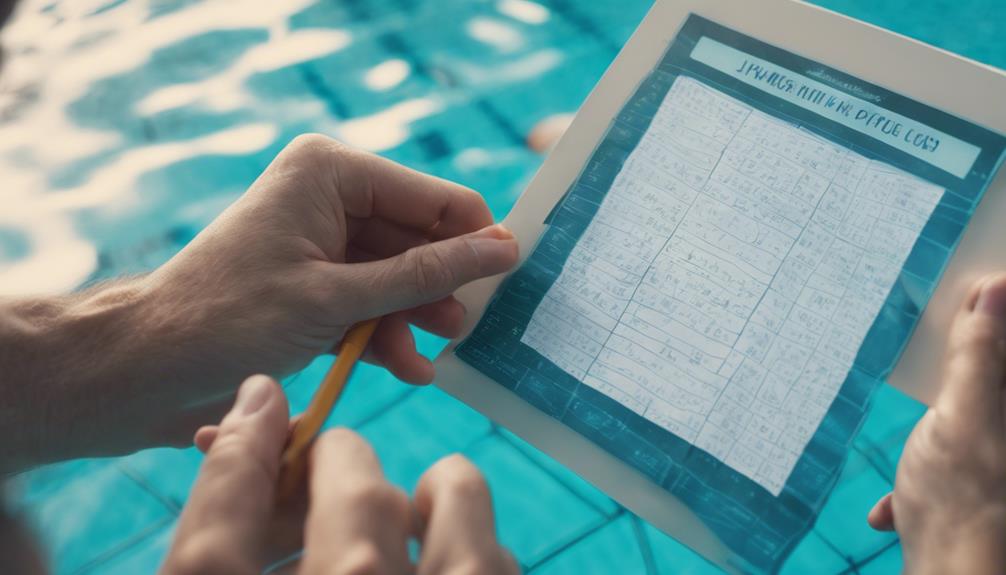
Consider analyzing the itemized costs and materials provided in each quote when comparing multiple options for a swimming pool project. It's essential to find the best value for your investment by evaluating the labor and material breakdowns offered in each quote.
Look for transparent pricing that includes details on the quality of materials, equipment, and workmanship to make sure you're getting the most out of your budget. Be wary of any hidden fees, additional charges, or exclusions that could impact the overall cost.
By carefully examining the quotes side by side, you can determine which option provides the best combination of pricing and services. If there are any discrepancies or unclear items, don't hesitate to seek clarification from the pool companies to make an accurate comparison.
Additionally, consider reaching out to past clients for references or reviews to gauge the reputation and satisfaction levels of each company. Making an informed decision based on a thorough comparison will help you secure the best deal for your swimming pool project.
Negotiating for the Best Price

To negotiate for the best price when seeking quotes for your swimming pool project, compare offers from multiple contractors to leverage a favorable deal.
When negotiating for the best price for your pools or hot tubs, consider the following tips:
- Utilize your knowledge of average costs for inground pools to gauge the reasonableness of the quotes you receive.
- Engage in open discussions with the pool contractor about cost-saving strategies and potential discounts that could be applied to your project.
- Be ready to negotiate based on the specific project scope, desired features, and the materials to be used.
- Ask for a detailed breakdown of costs to identify areas where adjustments can be made to save money without compromising quality.
- Don't hesitate to express your budget constraints and explore flexible options that could help you achieve the best deal possible for your swimming pool.
Finalizing the Pool Project Agreement

Make sure that the pool project agreement includes a detailed breakdown of costs, materials, and timelines to avoid misunderstandings. Finalizing the pool project agreement is an important step in ensuring a smooth and successful pool construction process.
Confirm that all costs, including labor, materials, permits, and any additional fees, are clearly outlined in the agreement. It's essential to establish a structured payment schedule and understand any warranty information provided by the contractor.
Additionally, the agreement should clearly define the responsibilities of both parties involved, outlining the roles of the contractor and the homeowner to prevent any confusion during the project.
Review the agreement for clauses related to potential changes in design, unforeseen complications, and procedures for resolving disputes. If needed, seek legal advice to ensure that the pool project agreement aligns with industry standards and safeguards the interests of both parties.
Frequently Asked Questions
Can You Negotiate the Price of a Swimming Pool?
Yes, you can negotiate the price of a swimming pool. Factors like off-peak seasons, company workload, and competition can influence your negotiation potential.
Consider discussing cost-saving options and obtaining multiple quotes for leverage. Being open to communication and compromise can lead to a mutually beneficial agreement.
Keep in mind that negotiating the price of a swimming pool is common practice, and exploring different avenues can help secure a better deal.
What Should Be Included in a Pool Quote?
A thorough pool quote should include detailed breakdowns of materials, labor costs, equipment, and permits required for the project. Inclusions like excavation, plumbing, electrical work, landscaping, fencing, and any additional features should be clearly outlined.
Transparent pricing helps you understand the total cost and make informed decisions. Specify warranties, project timeline, and payment schedule. Clear communication avoids surprises during installation, ensuring a smooth process.
How Do You Estimate a Pool?
Estimating a pool involves considering factors like size, shape, materials, features, site preparation, and labor costs. Include expenses for excavation, permits, equipment, plumbing, electrical work, decking, landscaping, and fencing.
Calculate ongoing maintenance costs for chemicals, cleaning supplies, water testing kits, and potential repairs. Consult pool contractors for accurate quotes tailored to your preferences and site conditions.
Research various pool types (inground, aboveground, fiberglass) to find the best match for your budget and needs.
What Is the Most Cost-Effective Way to Put in a Pool?
When putting in a pool, the most cost-effective approach involves opting for a fiberglass pool over gunite or vinyl liners.
Timing construction during off-seasons like fall or winter can net you the best deals.
Selecting budget-friendly materials and features for your pool design is key to saving money.
Obtain multiple quotes from reputable contractors to compare prices and find the most cost-effective option.
Learning to perform DIY maintenance tasks will also help cut ongoing expenses.
What Factors Influence the Value of a Used Swimming Pool?
When determining the value of a used swimming pool, several factors come into play. The condition of the pool, its age, any additional features, and the overall demand for pools in the area are all crucial in determining the price. Utilizing effective strategies for selling used swimming pool is essential to maximize its value.
Conclusion
To sum up, by following the steps outlined in this guide, you can guarantee that you're getting the best deal when quoting a swimming pool.
Remember to:
- Set a realistic budget.
- Research reputable contractors.
- Choose essential features.
- Avoid costly add-ons.
- Consider long-term maintenance savings.
- Compare multiple quotes.
- Negotiate for the best price.
- Finalize the project agreement.
By taking these steps, you can make an informed decision that meets your needs and budget requirements.


